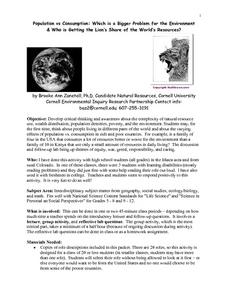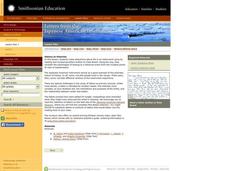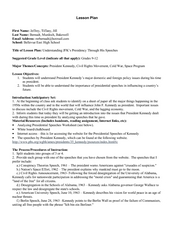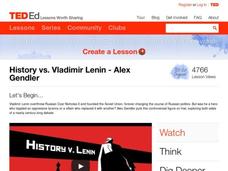Curated OER
The Chocolate War
Learners scrutinize the story, "The chocolate War" by Robert Cormier for examples of nonconformity in the face of power. The nature of the relationship between students in the story is compared to the associations of the reader.
Curated OER
Why War? Causes of the American Revolution and South Carolina's Role
Eighth graders investigate the role of South Carolina in the American Revolution. In this colonial American lesson, 8th graders analyze primary documents and images to determine how the state was involved in the outbreak of the war and...
Curated OER
Population Vs Consumption: Which is a Bigger Problem for the Environment & Who is Getting the Lion's Share of the World's Resources?
Students develop critical thinking and awareness about the complexity of natural resource use, wealth distribution, population densities, poverty, and the environment. They think about people living in different parts of the world and...
Curated OER
History Repeats Itself
Twelfth graders research historical turning points, gather-data, and extrapolate possible alternate outcomes. They work individually to choose one historical event from Attachment D, Historical Turning Points. Students complete either...
Curated OER
Trench Warfare in WWI
A very short presentation on the reality of trench warfare. Provided is a brief look into the who, what, when, and why of trench warfare. Three different follow-up activities are suggested.
Curated OER
DINNER ON THE HOMEFRONT
Students, after analyzing how World War II affected life at home, plan a balanced meal on rationed food. They assess the experiences of Mainers on the home front during the war and how rationing food helped the war effort. In addition,...
Curated OER
War and the Media Press Freedom vs. Military Censorship
Learners analyze the relationship between war and media. In this media awareness instructional activity, students listen to their instructor present a lecture on freedom of the press and military censorship. Learners participate in an...
Curated OER
World War Ii - Japanese American Internment
Ninth graders determine that nationality is not defined by race, especially in the United States. They group into teacher created dyads with eight pictures. Four pictures are of American citizens (multiracial representations), and...
Curated OER
Letters from the Japanese American Internment
Students examine letters of Japanese-American children during internment in World War II. They discover what it was like in the camps and how they were treated once they were released. They also view photographs of the camps.
Curated OER
Lost Names: Scenes From a Korean Boyhood,
What a great resource to share! Based on the book Lost Names by Richard Kim, this valuable lesson focuses on the Japanese occupation of Korea during WWII. Additionally, it employs first-person journaling as a mode of understanding themes...
National Endowment for the Humanities
Mexican Culture and History through Its National Holidays
Young historians have an opportunity to study the complex history and culture of Mexico by learning about several holidays: The Feast of Our Lady of Guadalupe (Dia de Nuestra Senora de Guadalupe), The Day of the Dead (El Dia de los...
Curated OER
The Arab-Israeli Conflict
Provide your class with a context and series of events that has led to the conflict in the Middle East. They read 4 separate passages and answer 1 critical thinking question for each. Four more questions are posed at the bottom of the...
Global Oneness Project
Architectural Wonders
Angkor Wat, a UNESCO World Heritage Site located in Cambodia, is the focus of a lesson that asks class members to consider factors that could result in the destruction of these archeological treasures. Pupils listen to a lecture on the...
Roy Rosenzweig Center for History and New Media
The Revolutionary Times as Seen Through the Eyes of Women
The role of women before and during the American Revolution changed dramatically. To gain an understanding of these changes, middle schoolers analyze primary source documents, including letters from women that supported the patriot cause...
Curated OER
Understanding JFK's Presidency through his Speeches
Students reflect and discuss the major events that happened in the United States in the 1950's and 1960's. In this U.S. History lesson plan, students read and analyze the famous speeches during this time frame, then complete a worksheet...
Prestwick House
Lord of the Flies
Nothing about William Golding's Lord of the Flies is straightforward, but you can map out the characters and key details in a helpful crossword puzzle. Twenty-seven clues review the book in an engaging and fun way.
State Bar of Texas
Tinker v. Des Moines
Freedom of speech allows anyone, even those in school, to say and do what they feel—right? The 1969 Supreme Court case Tinker v. Des Moines serves as the backdrop for a study on First Amendment rights. Scholars use a short video along...
TED-Ed
History vs. Vladimir Lenin
Vladimir Lenin is on trial in an engaging, animated video where the merits and consequences of the formation of the Soviet Union and Lenin's actions are reviewed. This is a great way to illustrate how to establish and argue unique...
PBS
The Roosevelts: An Intimate History—Snapshot Lessons
The Roosevelt family was one of the most influential and prominent political forces in the 20th century, leaving behind a wide-ranging legacy of conservation, progressivism, and economic growth. Learn more about President Theodore...
DocsTeach
The Impact of the Immigration Act of 1924
Welcome to America ... only if you're on an approved list. The activity uses a map to explain how the Immigration Act of 1924 placed quotas on immigration from certain countries, such as India. Scholars analyze the map, complete a...
Curated OER
Armenian Genocide
As your historians examine the beginnings of WWI, ensure they are familiar with the Armenian Genocide. This basic introductory lesson plan utilizes teacher-led discussion, map analysis, and a Socratic seminar. Not much detail is offered...
Curated OER
Imperialism and Expansion: Part 2
Students explore the concept of American Imperialism. In this American foreign policy lesson, students take notes on the Spanish-American War and foreign policy practices of the United States in the late 1800s.
Curated OER
Woodrow Wilson: Prophet of Peace
Students read and discuss various speeches by Woodrow Wilson, and write and present a brief radio address that will persuade the nation to return to world peace. Students analyze current events and discuss whether the world has upheld...
Curated OER
World War II Holocaust Introduction
Students explore the concept of identity by categorizing themselves based on physical characteristics. In this Holocaust lesson, students discuss the differences between their classmates and separate each other based on petty physical...
Other popular searches
- World War Ii
- World War I and Ii
- Causes of World War I
- Causes World War Ii
- World War Ii Map
- World War Ii Holocaust
- World War Ii Battles
- Post World War Ii
- Propaganda World War Ii
- Causes of World War Ii
- World War I Causes
- World War Ii Newspaper

























